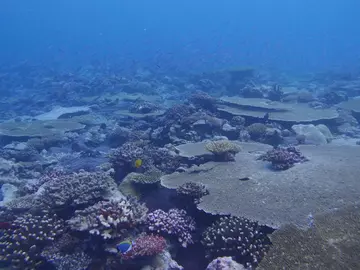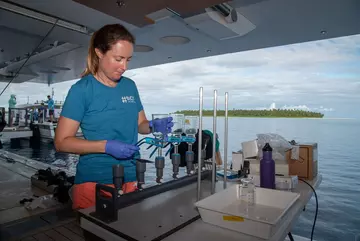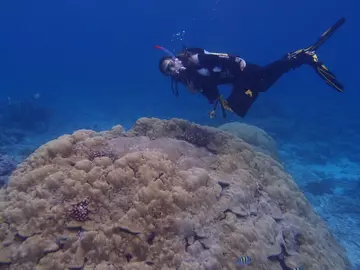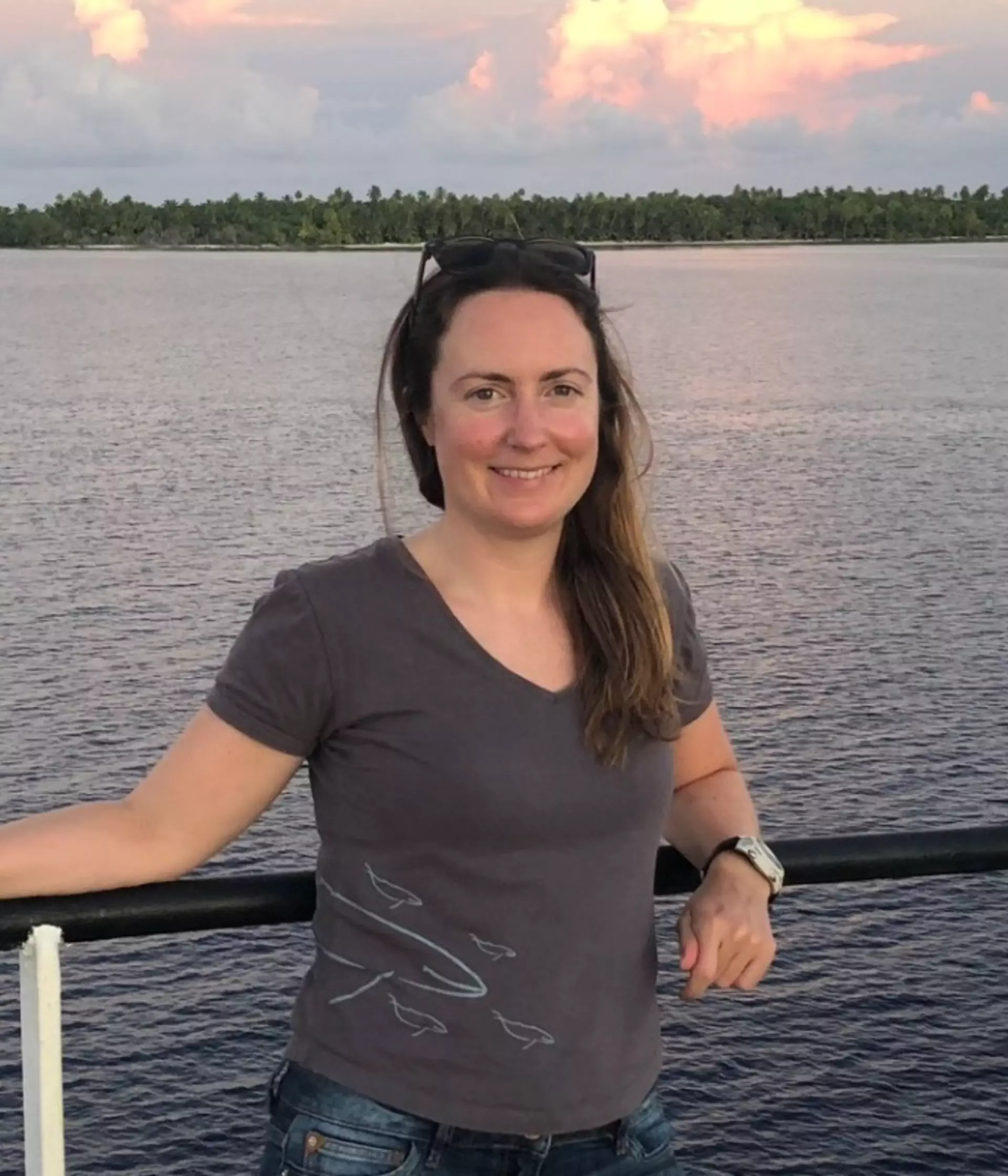
Marine biology
Genomics
Climate change
Institute of Zoology
Zoological Society of London
London
NW 14RY
United Kingdom
Coral reefs are the most biodiverse marine ecosystem, harboring over a quarter of all marine species.
Coral reefs are also worth billions of dollars in goods and services, for examples fisheries, coastal protection and tourism. Reefs face human pressures on the local scale, such as unsustainable and destructive fishing methods, and on the global scale, such as climate change-induced increases in sea surface temperatures leading to coral bleaching and consequently often mortality. Most reefs globally are predicted to experience annual severe bleaching, from which ecosystem collapse would ensue, in the next 50 years. In the face of such dire threats to a beautiful and vital ecosystem, it is imperative we better understand reef resilience and how we can help build this resilience across local, regional and global scales.

My works seeks to better understand reef resilience to both direct human impacts and climate change induced impacts through identifying networks of connectivity on the reefs, hotspots of reef biodiversity and productivity, as well as understanding what is driving these patterns. I take a multi-disciplinary approach to studying reef resilience using ecological surveys, genomic methods, geophysical approaches and modelling. I aim to work with all stakeholders to ensure our conservation research is used to inform reef management and conservation strategies to protect biodiversity and livelihoods. I particularly enjoy collaborative research across difference disciplines and locations, and have worked in the Indian Ocean, Caribbean and Indo-Pacific regions.

Currently I’m investigating coral genomic connectivity, and ocean currents as drivers of larvae dispersal, in the Indian Ocean to better understand recovery patterns from the third mass coral bleaching event (2014-2017) and their future resilience. I supervise and support multiple PhD and MSc students enabling me to be involved in a range of other research and conservation initiatives, with the aim to help mitigate the threats to our marine ecosystems and engage the general public in marine conservation.
I am optimistic that by undertaking research collaboratively across disciplines, harnessing the latest technological innovations, and engaging with local communities, we can find ways to build reef resilience, mitigating the impacts of climate change, whilst the policy makers, industry, and individuals work to reduce our carbon emissions.

If you are interested in Catherine's work, or thinking of applying for a PhD or MSc in this field and would like to learn more, please get in touch at catherine.head@ioz.ac.uk
2018-present: Postdoctoral Researcher and Co-principle Investigator, Institute of Zoology & University of Oxford
2017-present: Stipendiary Lecturer at St Peter’s College, University of Oxford
2015-present: Committee member of Reef Conservation UK
2016-2017: Postdoctoral Researcher at University of Oxford & Science Coordinator for Nekton Foundation
2012-2015: PhD (NERC Case funded) at University of Oxford with case partner ZSL, studying the diversity of coral associates
2010-2012: EDGE Coral Reef Project Coordinator, Conservation Programmes, ZSL
Burt A, Vogt-Vincent N, Johnson H, Sendell-Price A, Kelly S, Clegg SM, Head CEI, Bunbury N, Fleischer-Dogley F, Jeremie M, Khan N, Baxter R, Gendron G, Mason-Parker C, Turnbull LA (2024) Integration of population genetics with oceanographic models reveals strong connectivity among coral reefs across Seychelles. Sci. Rep. 14. https://doi.org/10.1038/s41598-024-55459-x
Dowell R, Dunn N, Yesson C, Williams J, Head CEI, Ransome E. (2024) Environmental DNA captures diurnal fluctuations of surface eukaryotes on a tropical coral reef. Environmental DNA. https://doi.org/10.1002/edn3.512
Bridge TCL, Cowman PF, Quattrini AM, Bonito V, Sinniger F, Harii S, Head CEI, Hung JY, Halafihi T, Rongo T, Baird AH (2023) A tenuis relationship: traditional taxonomy obscures systematics and biogeography of the ‘Acropora tenuis’ (Scleractinia: Acroporidae) species complex. Zoological Journal of the Linnean Society, zlad062, https://doi.org/10.1093/zoolinnean/zlad062
Steyaert M, Lindhart M, Khrizman A, Dunbar RB, Bonsall MB, Mucciarone DA, Ransome E, Santodomingo N, Winslade P, Head CEI (2022) Remote reef cryptobenthic diversity: Integrating autonomous reef monitoring structures and in situ environmental parameters. Front. Mar. Sci., 9| https://doi.org/10.3389/fmars.2022.932375
Steyaert M, Mogg A, Dunn N, Dowell R, Head CEI (2022) Observations of coral and cryptobenthic fluorescence and recruitment on Autonomous Reef Monitoring Structures (ARMS) Coral Reefs 41, 877-883 doi: https://doi.org/10.1007/s00338-022-02283-2
Williamson MJ, Tebbs EJ, Thompson HJ, Dawson TP, Head CEI, Jacoby DMP (2022) Monitoring shallow coral reef exposure to environmental stressors using satellite earth observation: the reef environmental stress exposure toolbox (RESET). Remote Sensing in Ecology and Conservation. https://doi.org/10.1002/rse2.286
Colin L, Yesson C, Head CEI (2021) Complete mitochondrial genomes of three reef forming Acropora corals (Acroporidae, Scleractinia) from Chagos Archipelago, Indian Ocean. Biodivers Data J. 2021;9:e72762. doi:10.3897/BDJ.9.e72762
Andradi-Brown DA, Beer AJE, Colin L, Hastuti, Head CEI, Hidayat NI, Lindfield SJ, Mitchell CR, Pada DN, Piesinger NM, Purwanto, Ahmadia GN (2021) Highly diverse mesophotic reef fish communities in Raja Ampat, West Papua. Coral Reefs 40, 111–130. https://doi.org/10.1007/s00338-020-02020-7
Andradi-Brown DA, Banaszak AT, Frazer TK, Gilchrist H, Harborne AR, Head CEI, Koldewey HJ, Levy E, Richards K, Short R, Sweet M, Teleki K, Voolstra CR, Wilson B, Wood E, Yarlett RT, Curnick DJ (2020) Editorial: Coral Reefs in the Anthropocene – Reflecting on 20 Years of Reef Conservation UK. Frontiers in Marine Science. 7. doi:10.3389/fmars.2020.00364
Andradi-Brown DA, Beer AJ, Colin L, Head CEI, Hidayat NI, Lindfield SJ, Mitchell CR, Pada DN, Piesinger NM, Sabrang H, Ahmadia GN (2019) Record highest mesophotic fish diversity found in Raja Ampat. BioRxiv. 20:640490
Head CEI, Bayley D, Roche R, Turner J, Rogers AD, Koldewey H, Rowlands G, Tickler DM, and Andradi-Brown DA (2019) Coral bleaching impacts from back-to- back 2015-2016 thermal anomalies in the remote central Indian Ocean. Coral Reefs. https://doi.org/10.1007/s00338-019-01821-9
Head CEI, Koldewey H, Pavoine S, Pratchett MS, Rogers AD, Taylor M. and Bonsall MB (2018) Trait and Phylogenetic Diversity Provide Insights into Community Assembly of Reef-Associated Shrimp (Palaemonidae) at Different Spatial Scales across the Chagos Archipelago. Ecology and Evolution. 1-10. 10.1002/ece3.3969
Head CEI, Bonsall MB, Koldewey H, Jenkins TL, Pratchett MS, and Rogers AD (2018) Exceptional biodiversity of the cryptofaunal decapods in the Chagos Archipelago, central Indian Ocean. Marine Pollution Bulletin. Doi: 10.1016/j.marpolbul.2018.07.063
Andradi-Brown DA, Head CEI, Exton D, Hunt C, Hendrix A, Gress E, Rogers AD (2017) Identifying zooplankton community changes between shallow and upper- mesophotic reefs in Mesoamerican barrier reef, Caribbean. PeerJ. 5. Doi: 10.7717/peerj.2853
Head, CEI (2015) Community structure of coral-associated fauna of reefs in the Chagos Archipelago [PhD thesis]. University of Oxford
Head CEI, Bonsall M, Koldewey H, Pratchett MS, Speight M, Rogers AD (2015) High prevalence of obligate coral-dwelling decapods on dead corals in the Chagos Archipelago, central Indian Ocean. Coral Reefs. 34:3. Doi: 10.1007/s00338-015- 1307-x
Roche RC, Pratchett MS, Carr P, Turner JR, Wagner D, Head C, Sheppard CRC (2015) Localized outbreaks of Acanthaster planci at an isolated and unpopulated reef atoll in the Chagos Archipelago. Marine Biology. 162:1695-1704
Redding D, Curnick D, Head CEI, Crabbe J, Gollock M, Harding S, Hoeksema B, Koldewey H, Johnson K, Jones R, Obura D, Rosen B, Smith D, Taylor M, Turner J, Wren S (2015) Setting evolutionary based conservation priorities for a phylogenetically data-poor taxonomic group (Scleractinia): response to the commentaries. J. Animal Conservation. 18:4:320-1 https://doi.org/10.1111/acv.12228
Curnick D, Head CEI*, Crabbe J, Gollock M, Harding S, Hoeksema B, Koldewey H, Johnson K, Jones R, Obura D, Rosen B, Smith D, Taylor M, Turner J, Wren S, Redding D (2015) Setting Evolutionary-based conservation priorities for a phylogenetically data-poor group (Scleractinia). J Animal Conservation. 18. Doi: 10.1111/acv.12185. *Joint first author
Reviews
Hays GC, Koldewey HJ, Andrzejaczek S, Attrill MJ, Barley S, Bayley DTI, Benkwitt CE, Block B, Schallert RJ, Carlisle AB, Carr P, Chapple TK, Collins C, Diaz C, Dunn N, Dunbar RB, Eager DS, Engel J, Embling CB, Esteban N, Ferretti F, Foster NL, Freeman R, Gollock M, Graham NAJ,· Harris JL, Head CEI, Hosegood P, Howell KL, Hussey NE, Jacoby DMP, Jones R, Sannassy Pilly S, Lange ID, Letessier TB, Levy E, Lindhart M, McDevitt-Irwin JM, Meekan M, Meeuwig JJ, Micheli F, Mogg AOM, Mortimer JA, Mucciarone DA, Nicoll MA, Nuno A, Perry CT, Preston SG, Rattray AJ, Robinson E, Roche RC, Schiele M, Sheehan EV, Sheppard A, Sheppard C, Smith AL, Soule B, Spalding M, Stevens GMW, Steyaert M, Stifel S, Taylor BM, Tickler D, Trevail AM, Trueba P, Turner J, Votier S, Wilson B, Williams GJ, Williamson BJ, Williamson MJ, Wood H, Curnick DJ (2020) A review of a decade of lessons from one of the world’s largest MPAs: conservation gains and key challenges. Marine Biology 167, 159. https://doi.org/10.1007/s00227-020-03776-w
Book Chapters
Andradi-Brown DA, Dinesen Z, Head CEI, Tickler DM, Rowlands G, Rogers AD (2019) Mesophotic coral ecosystems in the Chagos Archipelago. In: Loya,Y, Puglise KA, Bridge TCL (Eds.) Mesophotic coral ecosystems. Springer International Publishing. Doi: 10.1007/978-3-319-92735-0
